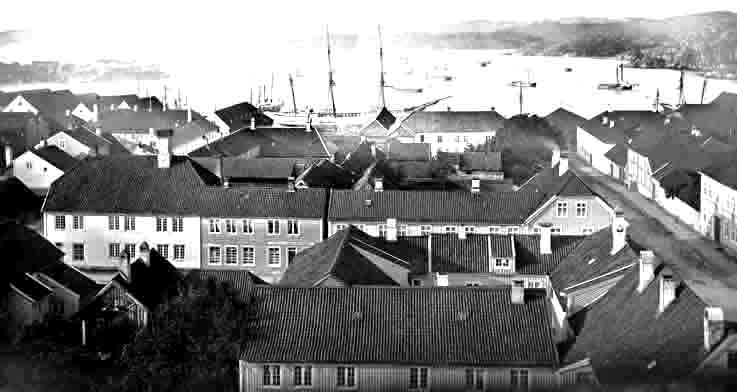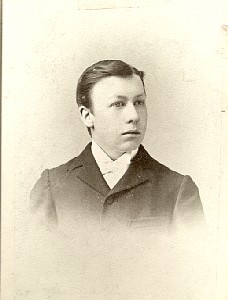The story of the Monsen Emigration by L.J.Munson
Lawrence J Munson family: in 1884, Lauritz Andreason (changed to Monsen then later Munson) sent for his family to join him in Brooklyn, NY, where he had been for less than a year. His wife Josephine and 9 children, one adopted and one only 9 months old, left Kristiansand on the steamship Thingvalla in June 1884. Click here for some promotional literature about the Thingvalla line from 1889. And click here to read about Castle Garden, the immigrant arrival center at that time. My grandfather, later known as Lawrence J. Munson, was one of those children. he was 6 years old at the time. He described that emigration in letters to his son Larry during the war. Here they are:
from Letters from Lawrence Josiah Munson
to Lawrence Shipley Munson
Oct 27 - 1944
…stuff removed …
Let me tell you the little I know of your ancestors in the male line.
Your Great-Great-Grandfather LARS MUNSON (spelt formerly Monsen) was born in Bergen, Norway about the year 1790. He moved to Christians Sand (Kristianssand S.) in 1814.
 Kristiansand in 1892 from Vest-Agder Fylkesmuseum, arkiv nr. 5041
Kristiansand in 1892 from Vest-Agder Fylkesmuseum, arkiv nr. 5041
His son (oldest) Andreas Munson died about 1895 in Christianssand. I remember him very well although I was only six years old when I last saw him. It was the great adventure for all of us - and my grandfather brought us out in a row boat to the steamer lying out in the harbor all ready to leave for America. That morning I was dressed and ready early, and was sent upstairs to bid Goodbye to my grandmother who at the time was busy roasting coffee beans in her fireplace. Tears rolled down her furrowed cheeks as she kissed me good bye - but there was no cessation of work in the creed of these old stoics, duties were not to be neglected! As we walked along our street carrying what baggage we could, I remember a woman running out of her house and coming over toward me - she was the mother of my play-mate Frederick - but I was impatient with sentimental leave-taking, and just wanted to move on. Weren’t we going on the big steamboat to sail out on the wild ocean and then reach a new country?
[Ed note: they lived just a few blocks from the harbor at Henrik Wergelands gate 104 which burnt down in 1892 and was rebuilt. Click here for my blog post from visiting there.]What America was I did not know, but I had imbibed enough of family talk to realize it was a land of plenty and an interesting place to go to. My mother who had lived in the same house with her mother-in-law, and old-maid sister in-law for the last twenty years was so glad to get away that she did not even want to take a last look at the old city, but went at once below decks. We waved good bye to grandfather as he rowed back to the dock and that was the last time we saw him. We sailed away from Norway on July 12, 1884 [ed note - that was actually the arrival date, their departure date was early June] - and I was not to see the old place again for twenty-one years when I came back for a few weeks in August 1905. That was the year I spent as a music student in Paris, but of that later.
The second day out was clear and cool with nothing but ocean on all sides of us.
On third and fourth day out my mother and many other passengers were sick, but I was up on deck every day save one or two when owing to stormy weather no one was allowed on deck. We were all in the "steerage" only Andreas, my oldest brother (who was then about 19) was not permitted to stay with the family groups, but had to join the men in another compartment. To be continued
Dad

"Munson Saga" 2
Dear Binks,
... non saga stuff removed ...
Well the Atlantic was rough and wild at times during July 1884 and our boat rolled and pitched in the heavy seas. I was tremendously impressed by the huge waves, which seemed like mountains to me. I do not remember feeling any fear to speak of and the day or two when I was confined downstairs, I remember standing looking out through the port holes which the giant waves would cover every time the boat rolled to starboard. I must try to impress you with nautical terms!
To stand on the deck of a steamer in mid-ocean and scan the horizon for a possible passing vessel - is thrilling. I remember seeing a whale leap out of the water not very far from our ship. My mother was sick in bed most of the time and I don’t remember much about my brothers and sisters - I was so excited about the great adventure of it all that it absorbed all my interest. Then one morning I awoke in what seemed an unnatural quiet, - the ship was perfectly still and becalmed. I missed the regular engine vibrations I had grown used to during the last fourteen days. Coming up on deck I had my first view of New York bay - with the green hills of Staten Island and Bay Ridge on either side of us, and as I looked over the ship’s rail I saw small boats with big smoke stacks moving about - tug-boats I learned later on - but it seemed to me they were so low in the water, their decks almost level with the surface, that I could not understand how they could keep afloat. The first music I heard in America was the friendly voice of a rooster crowing on Staten Island.
Then we slowly moved up the bay and there was much for me to see. As we neared different docks, where men were working, I looked eagerly to see if I could find my father.
Then we boarded a barge and landed at the Battery and were taken to Castle Garden (later on it became the aquarium) and here we saw father wearing a natty blue serge suit and a white straw hat. After a while we moved on carrying bits of hand baggage and I was told we were going across the river in another boat. As we moved into the dock I expected to walk through to the boat, but was told to sit down and the whole dock then started to move. We were on the Hamilton Ferry, and in a short time landed in old Brooklyn where we were to spend many years for better or worse!
It was a blistering hot day(July 12th) and we had been outfitted with warm coats etc. from Norway wherewith to meet the chilly Atlantic gales. Father walked first carrying little Alfred (then 9 months old) and then followed mother and our big family of eight children. Wish we could now have a "movie" of the motley procession.
Love Dad
(to be continued)
Munson Saga III
Dec. 11 - ‘44
Dearest Binks,
In writing my 3rd installement of the "Munson Saga" - which I do with your encouragement. I find it difficult to decide what to include and what to discard in the multitude of events that followed our entrance into a new country.
To "separate the wheat from the chaff" is the question, which the Jews of Palestine decided by leaving it to the wind. So "Gone with the Wind" will apply to much of my life that may seem inconsequential.
I can only give my general impressions of those early years in America. My first impression was naturally that of wonder at everything new and strange. It was a great adventure into new and different conditions. My second reaction was one I shared with my mother - that of disappointment at the dirt and filth in Brooklyn in the summer of 1884. Goats were walking the streets eating the paper that littered the street. The people seemed to be largely Irish and Polish - and the children were dirty and quarrelsome. My mother who came from Norway’s southernmost city, Christianssand, was shocked beyond words. They pictured the U.S. as wealthy and prosperous, and here was poverty and unrestrained drinking. In our little Norsetown the streets were clean and in almost every house you would see potted geraniums or other flowers in the front windows. There were many poor people but they were clean and orderly, and there was no public display of poverty. I don't remember having any language difficulty. English at the age of six came easy and naturally, but for many years we talked Norwegian at home. My mother with her family of eight children felt she was too busy to learn a new language, and the children did all the shopping. It was only later on as she would hear the children glibly jabber on in this new tongue, that she wanted to know more of this new language. Her children used English among ourselves - especially when we did not want mother to know of our exploits. It had its great advantages and mother was not slow to catch on.
[for more about his childhood from these letters click here]
Previous page: Åstveit or Aastvedt farm in Aasne, Hordaland Next page: The Monsen family from Kristiansand in America
